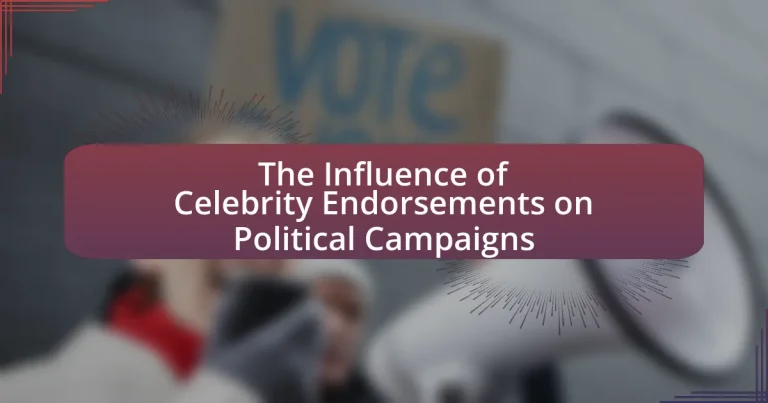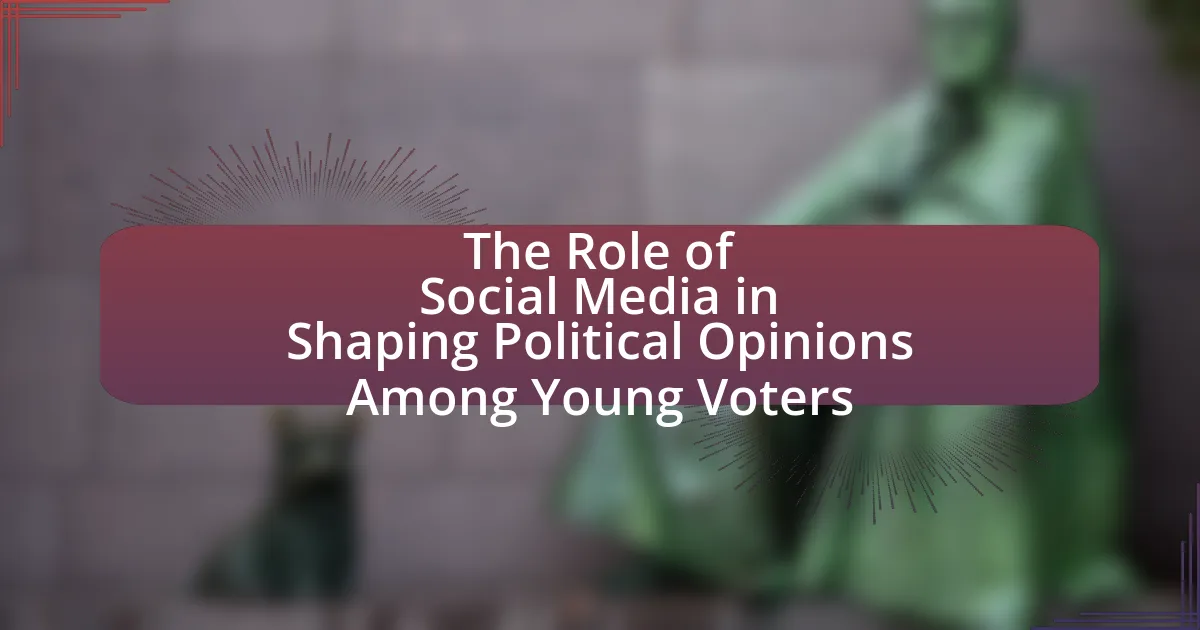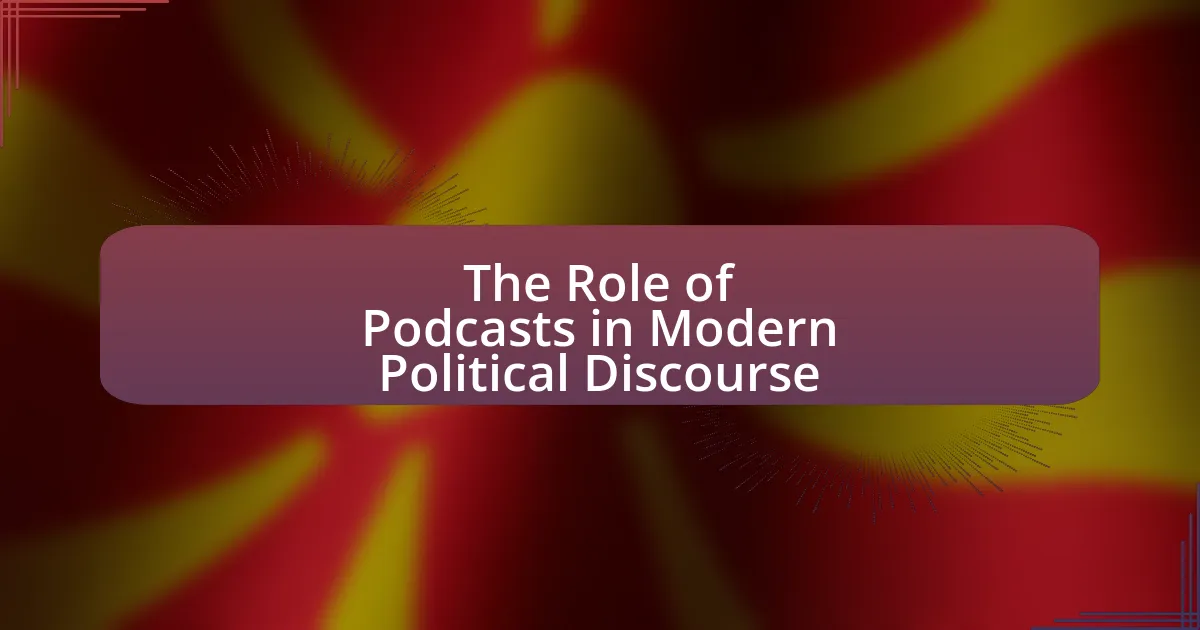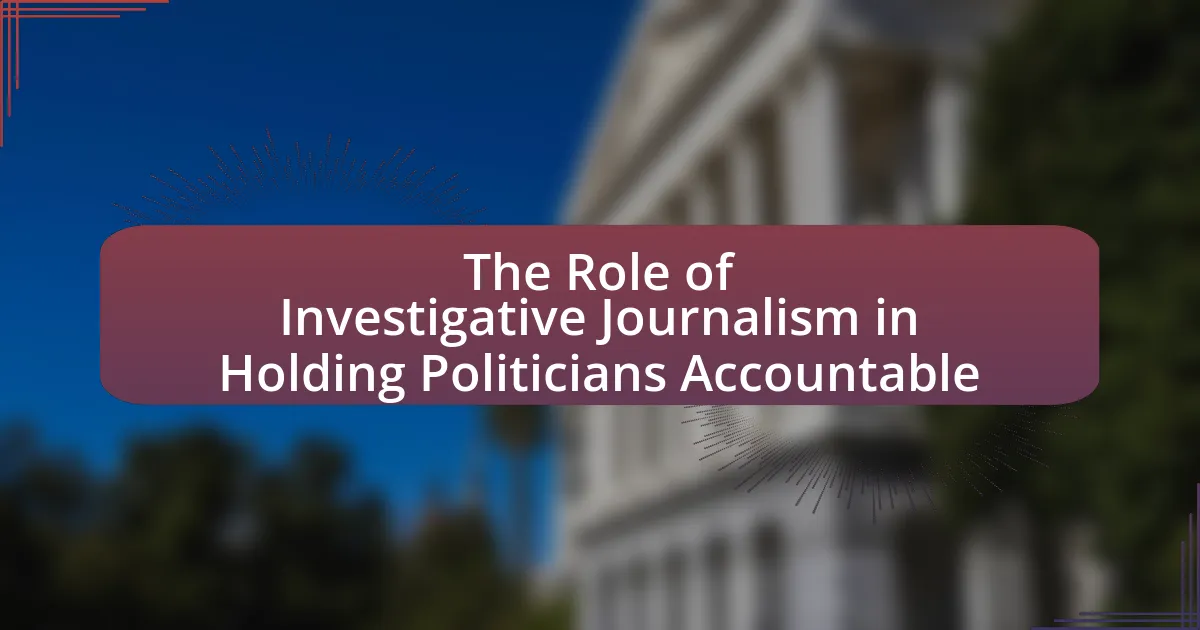Celebrity endorsements play a significant role in shaping political campaigns by enhancing candidate visibility and credibility, particularly among younger voters. Research indicates that endorsements from well-known figures can lead to increased voter support, with studies showing a potential 10-20% boost in favorability ratings. The article explores the psychological mechanisms behind these endorsements, their impact on voter perceptions, and the advantages and drawbacks they present for political campaigns. It also examines how different demographics respond to celebrity endorsements and provides strategies for effectively leveraging these endorsements while addressing ethical considerations and potential pitfalls.
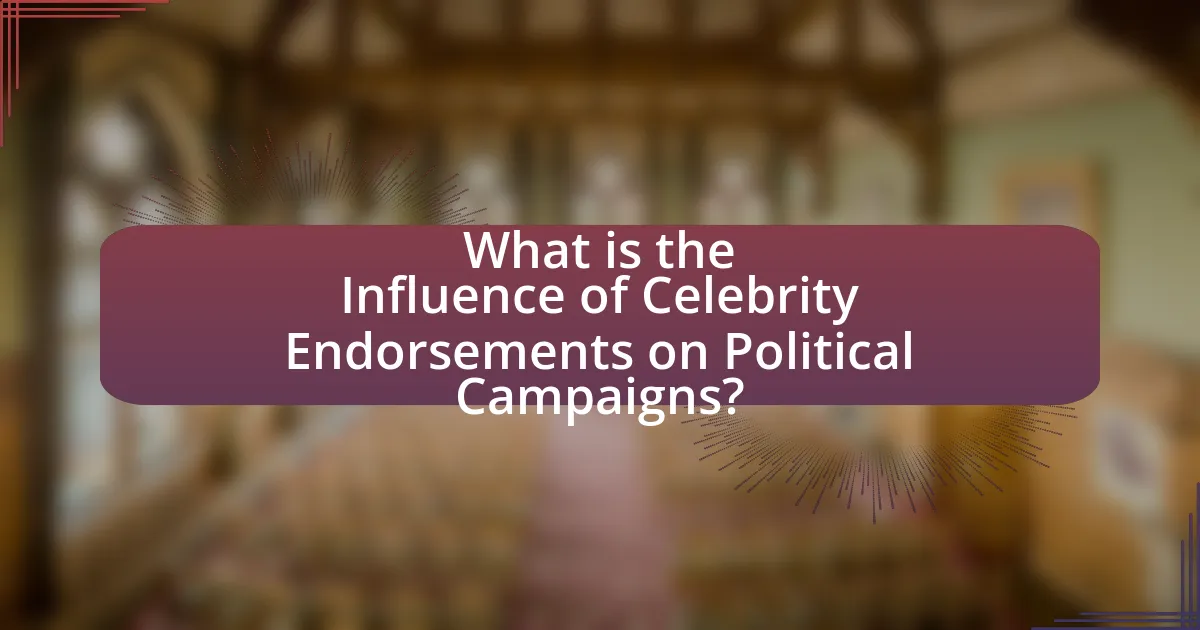
What is the Influence of Celebrity Endorsements on Political Campaigns?
Celebrity endorsements significantly influence political campaigns by enhancing candidate visibility and credibility. Research indicates that endorsements from well-known figures can sway undecided voters and increase voter turnout. For instance, a study published in the Journal of Political Marketing found that celebrity endorsements can lead to a 10-20% increase in support for a candidate among young voters. This effect is particularly pronounced in social media contexts, where celebrities can amplify messages rapidly and engage audiences effectively.
How do celebrity endorsements impact voter perceptions?
Celebrity endorsements significantly impact voter perceptions by enhancing the visibility and appeal of political candidates. Research indicates that endorsements from well-known figures can increase a candidate’s likability and credibility, leading to a more favorable public image. For instance, a study published in the Journal of Political Marketing found that celebrity endorsements can sway undecided voters, particularly among younger demographics, by leveraging the celebrity’s influence and social capital. This effect is further supported by data showing that candidates endorsed by celebrities often experience a boost in polling numbers, demonstrating the tangible impact of such endorsements on voter attitudes and behaviors.
What psychological mechanisms are at play in celebrity endorsements?
Psychological mechanisms in celebrity endorsements include social proof, identification, and the halo effect. Social proof occurs when individuals look to celebrities as role models, believing that if a celebrity endorses a product or candidate, it must be valuable or trustworthy. Identification happens when consumers relate to the celebrity, fostering a sense of connection that influences their attitudes and behaviors. The halo effect leads consumers to attribute positive qualities of the celebrity, such as attractiveness or success, to the endorsed product or candidate, enhancing its appeal. Research shows that endorsements can significantly increase consumer trust and purchase intentions, as evidenced by a study published in the Journal of Advertising Research, which found that celebrity endorsements can boost brand recall by up to 20%.
How do endorsements shape public opinion about candidates?
Endorsements significantly shape public opinion about candidates by leveraging the credibility and influence of the endorser. When a well-known figure endorses a candidate, it can enhance the candidate’s perceived trustworthiness and appeal, leading to increased voter support. For instance, a study by the Pew Research Center found that 60% of voters reported being influenced by endorsements from celebrities or public figures, indicating their substantial impact on voter perceptions. This influence is particularly pronounced among younger demographics, who may prioritize the opinions of celebrities over traditional political endorsements.
Why do politicians seek celebrity endorsements?
Politicians seek celebrity endorsements to enhance their visibility and credibility among voters. The association with well-known figures can attract media attention and engage younger demographics, who may be more influenced by celebrities than traditional political figures. Research indicates that celebrity endorsements can significantly impact public perception; for instance, a study published in the Journal of Political Marketing found that candidates endorsed by celebrities experienced a measurable increase in favorability ratings. This strategy leverages the celebrity’s fan base, creating a broader platform for the politician’s message and potentially increasing voter turnout.
What advantages do celebrities bring to political campaigns?
Celebrities bring significant advantages to political campaigns by enhancing visibility and credibility. Their widespread recognition allows candidates to reach broader audiences, particularly younger voters who may be more engaged by celebrity influence. For instance, a study by the Pew Research Center found that 50% of young voters are more likely to support a candidate endorsed by a celebrity they admire. Additionally, celebrities can leverage their social media platforms to mobilize support and increase voter turnout, as seen in the 2020 U.S. elections where various celebrities actively encouraged their followers to vote, resulting in record voter participation.
How do endorsements enhance a candidate’s visibility?
Endorsements enhance a candidate’s visibility by leveraging the credibility and reach of the endorser, often resulting in increased media coverage and public awareness. When a well-known figure endorses a candidate, it attracts attention from both the media and the public, amplifying the candidate’s message and expanding their audience. For instance, a study by the Pew Research Center found that candidates who receive endorsements from celebrities experience a significant boost in social media engagement and news mentions, which directly correlates with heightened visibility in the political landscape.
What are the potential drawbacks of celebrity endorsements in politics?
Celebrity endorsements in politics can lead to several potential drawbacks, including the risk of oversimplifying complex issues. When celebrities endorse political candidates, their influence may overshadow substantive policy discussions, causing voters to focus more on the celebrity’s persona rather than the candidate’s qualifications or policies. This phenomenon can result in a misinformed electorate, as seen in the 2016 U.S. presidential election, where celebrity endorsements were prevalent but did not necessarily correlate with informed voting decisions. Additionally, celebrity endorsements can alienate certain voter demographics who may feel disconnected from the celebrity’s lifestyle or values, potentially leading to decreased voter turnout among those groups.
How can celebrity endorsements backfire on political campaigns?
Celebrity endorsements can backfire on political campaigns by alienating potential voters who may not share the same admiration for the celebrity. For instance, when a celebrity endorses a candidate, their controversial past or polarizing opinions can overshadow the candidate’s message, leading to negative public perception. A notable example is the backlash faced by John Kerry in the 2004 presidential election when he was endorsed by singer Bruce Springsteen; while some supporters appreciated the endorsement, others criticized it, arguing that it detracted from Kerry’s appeal to working-class voters. This illustrates how celebrity endorsements can create divisions rather than unify support, ultimately harming a campaign’s effectiveness.
What are the risks of relying too heavily on celebrity influence?
Relying too heavily on celebrity influence in political campaigns poses significant risks, including the potential for misinformation and the overshadowing of substantive policy discussions. When celebrities endorse candidates, their popularity can lead to voters prioritizing charisma over qualifications, which may result in electing individuals who lack the necessary experience or expertise. For instance, a study by the Pew Research Center found that younger voters are more likely to be swayed by celebrity endorsements, which can distort their understanding of critical issues. Additionally, celebrity influence can create a superficial engagement with politics, where voters may support candidates based on image rather than informed opinions, ultimately undermining democratic processes.
How do different demographics respond to celebrity endorsements?
Different demographics respond to celebrity endorsements in varied ways, influenced by factors such as age, gender, and cultural background. For instance, younger audiences, particularly Millennials and Gen Z, tend to be more receptive to celebrity endorsements, often viewing them as authentic and relatable, which can significantly impact their purchasing decisions and political views. In contrast, older demographics may exhibit skepticism towards celebrity endorsements, perceiving them as less credible or overly commercialized.
Research conducted by the American Psychological Association indicates that individuals aged 18-34 are more likely to trust endorsements from celebrities, with 70% of this group stating they feel more positively about brands endorsed by celebrities they admire. Meanwhile, studies show that women are generally more influenced by celebrity endorsements than men, particularly in beauty and fashion sectors, where emotional connection plays a crucial role.
Cultural background also affects responses; for example, minority groups may resonate more with endorsements from celebrities who share similar cultural experiences, enhancing relatability and trust. Overall, the effectiveness of celebrity endorsements varies significantly across different demographic segments, shaping their influence in political campaigns and consumer behavior.
What role does age play in the effectiveness of celebrity endorsements?
Age significantly influences the effectiveness of celebrity endorsements, as different age groups respond variably to endorsements based on their values and preferences. Research indicates that younger audiences, particularly Millennials and Gen Z, are more likely to be influenced by celebrity endorsements due to their affinity for social media and celebrity culture, with studies showing that 70% of young consumers trust endorsements from celebrities they admire. In contrast, older demographics may prioritize credibility and expertise over celebrity status, leading to a diminished impact of endorsements from younger celebrities. This generational divide highlights the necessity for political campaigns to tailor their celebrity endorsements to resonate with the specific age group they aim to influence, ensuring that the chosen celebrity aligns with the values and expectations of that demographic.
How do cultural factors influence the reception of endorsements?
Cultural factors significantly influence the reception of endorsements by shaping individuals’ values, beliefs, and perceptions. For instance, in collectivist cultures, endorsements from community leaders or celebrities who embody shared values are more likely to resonate, as they align with the group’s identity. Conversely, in individualistic cultures, endorsements that emphasize personal achievement and uniqueness may be more effective. Research indicates that cultural context affects how audiences interpret messages; for example, a study by Hofstede (1980) highlights that cultural dimensions such as power distance and uncertainty avoidance can alter the effectiveness of endorsement strategies. Thus, understanding cultural nuances is crucial for tailoring endorsements to maximize their impact in political campaigns.
What strategies can campaigns use to effectively leverage celebrity endorsements?
Campaigns can effectively leverage celebrity endorsements by strategically aligning the celebrity’s image and values with the campaign’s message. This alignment enhances credibility and relatability, as seen in the 2008 Obama campaign, which utilized endorsements from celebrities like Oprah Winfrey to attract younger voters and increase engagement. Additionally, campaigns should utilize social media platforms to amplify the reach of these endorsements, as research indicates that celebrity endorsements can increase message retention by up to 50%. By creating authentic content that showcases the celebrity’s genuine support, campaigns can foster a deeper connection with the audience, ultimately driving voter turnout and support.
How can campaigns select the right celebrity for their message?
Campaigns can select the right celebrity for their message by aligning the celebrity’s values, image, and audience with the campaign’s objectives. Research indicates that a celebrity’s credibility and relatability significantly impact audience perception; for instance, a study published in the Journal of Advertising found that endorsements from relatable celebrities can enhance message effectiveness by up to 50%. Additionally, analyzing the celebrity’s past endorsements and public behavior helps ensure consistency with the campaign’s message, thereby fostering trust and authenticity among voters.
What are best practices for integrating celebrity endorsements into campaign strategies?
Best practices for integrating celebrity endorsements into campaign strategies include selecting celebrities whose values align with the campaign’s message, ensuring authenticity in the endorsement, and leveraging the celebrity’s reach across multiple platforms. Aligning values is crucial; for instance, a celebrity known for environmental advocacy should endorse a candidate with strong environmental policies, enhancing credibility. Authenticity can be achieved by involving the celebrity in campaign activities, making their endorsement feel genuine rather than transactional. Additionally, utilizing social media, television, and public appearances maximizes the endorsement’s impact, as seen in the 2008 Obama campaign, which effectively used celebrity endorsements to engage younger voters and increase turnout.
What lessons can be learned from past political campaigns that utilized celebrity endorsements?
Past political campaigns that utilized celebrity endorsements demonstrate that such endorsements can significantly enhance a candidate’s visibility and appeal, particularly among younger voters. For instance, Barack Obama’s 2008 campaign effectively leveraged endorsements from celebrities like Oprah Winfrey, which contributed to a surge in voter turnout among demographics that typically engage less in the electoral process. Additionally, campaigns must ensure that the celebrity’s values align with the candidate’s message to avoid backlash; for example, endorsements from celebrities with controversial reputations can alienate potential supporters. Furthermore, the timing and manner of the endorsement are crucial; endorsements delivered during key moments, such as debates or major campaign events, can maximize impact. These lessons underscore the importance of strategic alignment and timing in leveraging celebrity endorsements for political gain.
Which successful campaigns effectively used celebrity endorsements?
Successful campaigns that effectively used celebrity endorsements include Barack Obama’s 2008 presidential campaign, which featured endorsements from celebrities like Oprah Winfrey and Jay-Z, significantly boosting voter engagement and turnout. Additionally, the 2016 campaign of Hillary Clinton utilized endorsements from stars such as Lady Gaga and Katy Perry, which helped to mobilize younger voters. These endorsements are supported by research indicating that celebrity influence can enhance public perception and increase campaign visibility, as evidenced by a study published in the Journal of Political Marketing, which found that celebrity endorsements can lead to a 20% increase in voter interest.
What failures in celebrity endorsements can inform future strategies?
Failures in celebrity endorsements often stem from misalignment between the celebrity’s image and the brand or candidate’s values, leading to public backlash. For instance, when a celebrity endorses a political candidate whose views contradict their own public persona, it can result in a credibility crisis. A notable example is the backlash faced by celebrities who endorsed candidates with controversial stances, which alienated their fan base and diminished the effectiveness of the endorsement. This highlights the importance of ensuring that the celebrity’s values resonate with the target audience and the campaign’s message. Additionally, poorly timed endorsements, such as those made during scandals or crises, can overshadow the intended message and lead to negative publicity. These failures indicate that future strategies should prioritize authentic alignment, timing, and audience perception to enhance the effectiveness of celebrity endorsements in political campaigns.
How can political campaigns measure the impact of celebrity endorsements?
Political campaigns can measure the impact of celebrity endorsements through various quantitative and qualitative methods. Surveys conducted before and after endorsements can assess shifts in voter sentiment, while social media analytics can track engagement metrics such as likes, shares, and comments related to the endorsement. For instance, a study by the Pew Research Center found that 70% of voters reported being influenced by celebrity endorsements, indicating a significant potential impact. Additionally, analyzing changes in polling data and voter turnout in demographics targeted by the celebrity can provide concrete evidence of the endorsement’s effectiveness.
What metrics are useful for assessing the effectiveness of endorsements?
Key metrics for assessing the effectiveness of endorsements include engagement rates, conversion rates, brand awareness, and sentiment analysis. Engagement rates measure how audiences interact with the endorsement, such as likes, shares, and comments on social media platforms. Conversion rates indicate the percentage of individuals who take a desired action, such as voting or donating, after being exposed to the endorsement. Brand awareness can be evaluated through surveys or tracking changes in search volume and social media mentions following the endorsement. Sentiment analysis assesses public opinion and emotional response to the endorsement, often through analyzing comments and feedback. These metrics provide a comprehensive view of how endorsements influence public perception and behavior in political campaigns.
How can campaigns adapt based on feedback from celebrity endorsements?
Campaigns can adapt based on feedback from celebrity endorsements by analyzing public reactions and engagement metrics to refine their messaging and strategies. For instance, if a celebrity endorsement generates significant positive social media engagement, campaigns can amplify that message or similar themes in future communications. Conversely, if feedback indicates a negative reception, campaigns may pivot their approach, either by distancing themselves from the celebrity or by addressing the concerns raised by the audience. This adaptability is supported by studies showing that endorsements can significantly influence voter perceptions and behaviors, highlighting the importance of responsive campaign strategies.
What are the ethical considerations surrounding celebrity endorsements in politics?
Celebrity endorsements in politics raise significant ethical considerations, primarily concerning authenticity, influence, and accountability. The authenticity of a celebrity’s support can be questioned, as their motivations may stem from personal gain rather than genuine belief in a political cause. This can mislead voters who may perceive the endorsement as a validation of the candidate’s values.
Moreover, the influence of celebrities can disproportionately sway public opinion, particularly among younger demographics, potentially undermining informed decision-making. Research indicates that celebrity endorsements can increase voter turnout by as much as 10%, highlighting their powerful role in shaping political landscapes.
Lastly, accountability is a critical issue; celebrities may not be held to the same standards as political figures, leading to a lack of responsibility for the consequences of their endorsements. This raises concerns about the integrity of the political process and the potential for manipulation of public sentiment.
How do endorsements affect the authenticity of political messages?
Endorsements can significantly undermine the authenticity of political messages by creating perceptions of insincerity and opportunism. When a political figure receives endorsements from celebrities, it may lead voters to question the genuineness of the candidate’s beliefs and values, as the endorsement can be seen as a strategic move rather than a reflection of true alignment. Research indicates that voters often perceive endorsed candidates as more focused on image and popularity than on substantive policy issues, which can dilute the perceived authenticity of their messages. For instance, a study published in the Journal of Political Marketing found that candidates with celebrity endorsements were often viewed as less trustworthy, as voters believed the endorsements were more about the celebrity’s influence than the candidate’s qualifications or integrity.
What responsibilities do celebrities have when endorsing political candidates?
Celebrities have the responsibility to ensure that their endorsements of political candidates are based on informed opinions and accurate information. This includes researching the candidates’ policies, values, and track records to avoid misleading their audience. For instance, a study published in the journal “Political Communication” found that celebrity endorsements can significantly influence voter perceptions, highlighting the importance of responsible messaging. Additionally, celebrities should be aware of the potential impact their endorsements may have on public opinion and voter turnout, as their influence can sway undecided voters or reinforce existing biases.
What practical tips can campaigns follow when considering celebrity endorsements?
Campaigns should ensure that the celebrity’s values align with their message and target audience. This alignment enhances authenticity and credibility, which are crucial for effective endorsements. For instance, a study by the Journal of Advertising Research found that congruence between a celebrity’s image and the brand significantly increases consumer trust and purchase intention. Additionally, campaigns should evaluate the celebrity’s past behavior and public perception to avoid potential backlash. Research indicates that negative publicity surrounding a celebrity can adversely affect the associated campaign, as seen in the case of endorsements that backfired due to the celebrity’s controversies. Finally, campaigns should leverage social media platforms to maximize the reach of the endorsement, as data shows that celebrity posts can generate substantial engagement and visibility, amplifying the campaign’s message.
How can campaigns effectively communicate the endorsement to their audience?
Campaigns can effectively communicate endorsements to their audience by utilizing multiple channels such as social media, television, and public appearances. These platforms allow campaigns to reach a broad audience quickly and engage them through various formats, including videos, interviews, and live events. For instance, a study by the Pew Research Center found that 69% of adults in the U.S. use social media, making it a vital tool for disseminating endorsement messages. Additionally, leveraging the celebrity’s existing fan base can amplify the message, as endorsements from well-known figures can enhance credibility and attract attention. This strategy is supported by research from the Journal of Advertising, which indicates that celebrity endorsements can significantly influence consumer attitudes and behaviors, thereby increasing the effectiveness of political campaigns.
What common pitfalls should campaigns avoid when using celebrity endorsements?
Campaigns should avoid several common pitfalls when using celebrity endorsements, including misalignment between the celebrity’s image and the campaign’s values. When a celebrity’s persona does not resonate with the campaign’s message, it can lead to public skepticism and backlash. For instance, a study by the Journal of Advertising Research found that endorsements from celebrities who do not authentically connect with the brand can diminish consumer trust and engagement. Additionally, campaigns should be cautious of over-reliance on celebrity status, as this can overshadow the core message and alienate voters who prioritize policy over personality. Lastly, failing to conduct thorough research on the celebrity’s past controversies can result in negative publicity that detracts from the campaign’s objectives.
